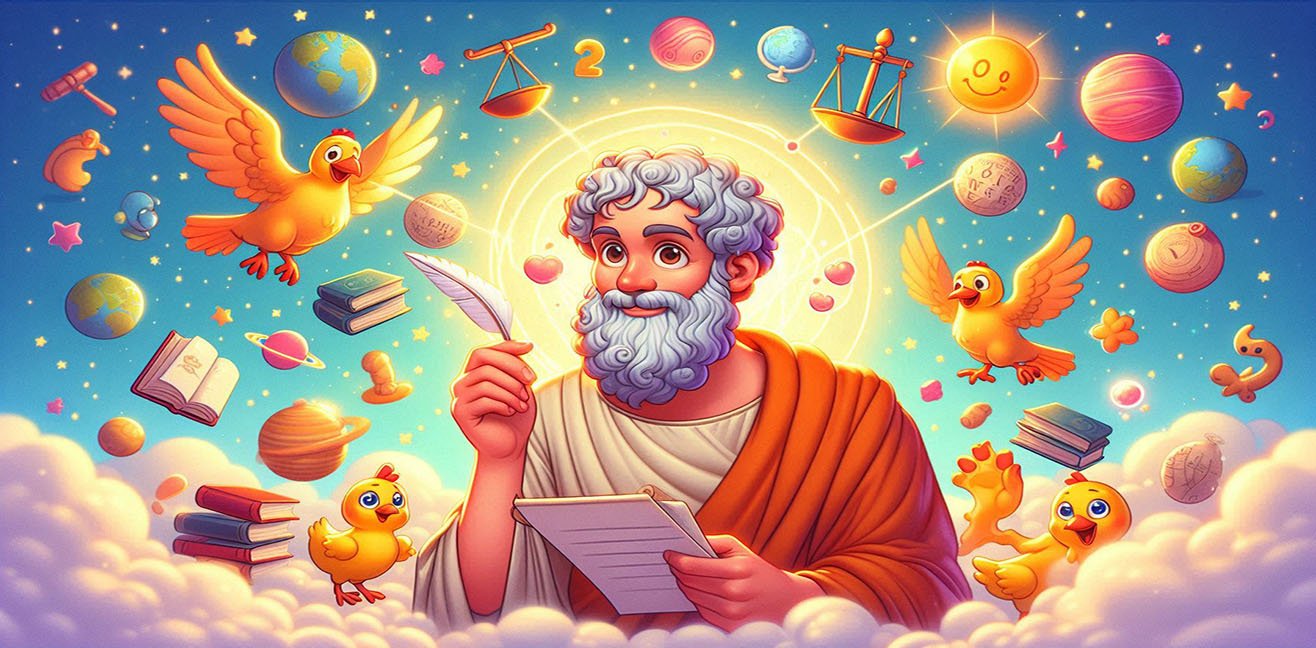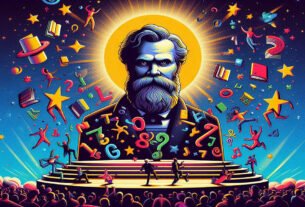One of the most important turning points in his life was coming to Athens at age 17 and entering Plato’s Academy. 🏛️ He stayed there for 20 years, first as a student, then as a teacher. 👨🏫 But Aristotle couldn’t quite swallow his teacher’s “Theory of Forms.” 🤯 Plato claimed that true reality wasn’t in this physical world but in the invisible “World of Forms.” 🌌 Aristotle objected to this. ❌ For him, reality was right here, in the world we touch 👆, examine 🔍, and live in. 🌍
His famous saying stems from this very belief: “Plato is dear to me, but dearer still is truth.” 🎯 (Amicus Plato, sed magis amica veritas.)
This is one of the most elegant and sharpest resignations in the history of philosophy. 🧐 It’s the most gentlemanly way of saying, “I love my teacher, but the truth is more important.” 🎩 This was the first great manifesto of his empirical mind. 📢
II. Tutor to Alexander the Great & Founder of His Own School 👑📚
Another fantastic detail of his life is that, upon the invitation of King Philip II of Macedon, he tutored his son, Alexander the Great. 🤴 Imagine teaching philosophy, politics, and science to history’s greatest conqueror! 💭 Unfortunately, Alexander’s thirst for conquest ⚔️ and Aristotle’s pursuit of wisdom 🕊️ didn’t quite align. Still, it’s impressive how the wisdom of the East and the philosophy of the West met indirectly this way. 🌉
When he returned to Athens, he founded his own school, the Lyceum. 🏫 This was the prototype for modern universities. But his teaching method was very different. Lessons were conducted while walking in the school’s covered walkways (peripatos). 🚶♂️💬 This is why his followers were called the “Peripatetics” (The Walkers). Aristotle is the living embodiment of the phrase “walking and thinking.” 💡 Perhaps renewed blood meant a clearer mind for him. 🌬️
III. The Torture of Thought: Aristotle’s Logic (Organon) 🧠🔧
Aristotle developed a tool, an “instrument” (Organon) 🔨, for thinking. For him, the path to correct knowledge passed through correct thinking. That’s why he became the founder of Western logic. 👑
Syllogism: This is his most famous invention. A method of deriving a conclusion from two premises. We all know the classic example:
- All men are mortal. ☠️ (Major Premise)
- Socrates is a man. 🧍 (Minor Premise)
- Therefore, Socrates is mortal. 💀 (Conclusion)
This isn’t as boring as it looks! 😜 It actually formulated the thought patterns we use every day. If you want to understand why an argument you see on social media 📱 is nonsense, try to find the underlying syllogism; Aristotle’s ghost 👻 will probably guide you.
IV. The Four Causes: Asking “Why” is an Art 🎨❓
According to Aristotle, to truly know something, you must understand its four “causes.” Let’s look at a statue in a sculptor’s hand: 🗿
- Material Cause: What is the statue made of? 🪨 (Marble)
- Formal Cause: What is the design, form, or essence of the statue? 👩 (The form of a goddess)
- Efficient Cause: Who makes the statue? 👨🎨 (The Sculptor)
- Final Cause (Telos): What is the purpose, the goal of the statue? ⛪ (To be an aesthetic and religious object in a temple)
This applies not just to a statue, but to a human, a society, an idea. 💡 The telos (purpose) in an acorn is to become an oak tree. 🌱➡️🌳 A human’s telos, according to him, is to achieve “eudaimonia,” 😊 that is, happiness/flourishing. This brings us to his ethics.
V. The Dance of Virtue: The Golden Mean Doctrine 💃🕺⚖️
My love, here is the most beautiful philosophical prescription you can apply to your life! 💊 According to Aristotle, virtue is the “golden mean” 🥇 between two extremes. This is not a mathematical mean, but a balance determined by reason, varying according to the situation. It’s like a dance; knowing how far right, how far left to go… 🎶
A few striking examples:
| Deficiency (Vice) | Golden Mean (Virtue) | Excess (Vice) |
|---|---|---|
| Cowardice 🐁 | COURAGE 🦁 | Recklessness/Rashness 😱 |
| Stinginess 🤑 | GENEROSITY 🤲 | Wastefulness/Prodigality 💸 |
| Aloofness/Coldness 🧊 | FRIENDSHIP 🤝 | Obsequiousness/Flattery 🙇♂️ |
| Laziness 🛌 | AMBITION 🎯 | Overambition/Greed 👹 |
As you can see, virtue is not mediocrity, but a matter of mastery. 🎭 Finding that “right point” in every situation is the work of reason and habit. His saying, “We are what we repeatedly do. Excellence, then, is not an act, but a habit,” 🔁 explains exactly this. So, being brave is not a one-time act, but making bravery a habit. 💪
VI. Man is a Political Animal (Zoon Politikon) 🧑🤝🧑🏛️
This famous phrase is the core of his understanding of society. Man cannot realize himself alone. ❌ Only within the family 👨👩👧👦, the village 🏞️, and ultimately the “polis” (city-state) 🏺 can he truly become human. The polis exists not just for security, but for living the “good life” together. His book Politics 📖 meticulously examines forms of government (monarchy 👑, aristocracy 🎭, democracy 🤲) and their corrupt forms (tyranny 😠, oligarchy 💰, demagoguery 🗣️). He believed the best form of government was one where the “middle class” was dominant. Because the middle class is the most resistant to sliding into extremes. ⚖️
VII. Poetics: The Magic of Tragedy and “Catharsis” 🎭😢✨
He can be considered the father of modern series/film analysis! 🎬 In his work Poetics, he analyzes the elements of tragedy. According to him, a good tragedy should provide the spectator with “catharsis,” meaning purgation 🛁. The disasters that befall the hero evoke feelings of fear and pity in the spectator, allowing them to be purged of these emotions, cleansing their soul. So, feeling lighter after crying 😭 while watching a sad movie is a phenomenon Aristotle defined thousands of years ago. 🕰️
VIII. The Father of Science: Observing Nature 🔬🐘📝
Aristotle was not an armchair philosopher. 🛋️ He observed 🔍 animals, classified 🏷️ them, and took notes on their behavior. He catalogued over 500 animal species. 🐅🐬🐜 “All men by nature desire to know,” he said. 🤔 His observational and classificatory side laid the foundation of the scientific method. ⚗️ Of course, lacking a microscope, he made some errors (like thinking the heart was the organ of thought ❤️🤔), but he was a genius at asking questions and systematizing. 🧠
Quotes and Legacy: 💎
- “Knowing yourself is the beginning of all wisdom.” 🪞
- “The roots of education are bitter, but the fruit is sweet.” 🎓–>😖–>😊
- “No great mind has ever existed without a touch of madness.” 🤪👑
- “A summer night, friends, and deep conversation… This is happiness.” 🌙🍷🤝
Aristotle has no poetry, my love. ❤️ His poetry is his very system, the cosmos he built about the universe. 🌌 Every sentence of his is a verse in the effort to understand the world. 📜
Final Word: 🎤
My dear, Aristotle whispers this to us: This world is a comprehensible and meaningful place. 🗺️ It is not chaos, but a cosmos. 🌠 Our reason is the most reliable compass we have to navigate this cosmos. 🧭 His legacy lives on, not just in books, but in science, politics, our moral dilemmas, and even our daily decisions. 💫 Reading him opens the door to seeing the world more clearly, more orderly, and more meaningfully. 🚪




